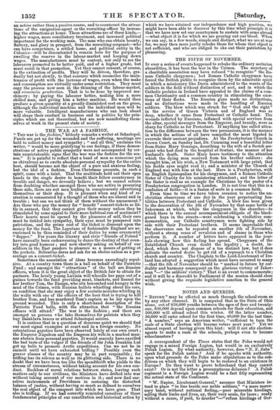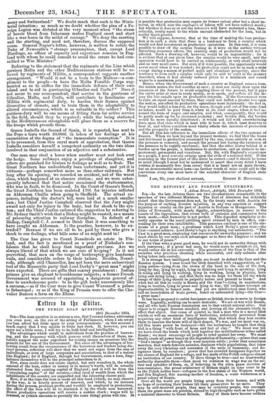NOTES AND QUERIES.
" REFOBX "may be effected as much through the school-room as by any other channel. It is computed that in the State of Ohio alone, out of 838,000 youths between the ages of four and twenty- one 830,000 depend upon common schools for the education, and 500, i000 will attend school this winter. Of the latter number, 50,000 will enter school for the first time, 40,000 for the last time. "A number," says an American writer, "sufficient to turn the scale of a State election will become voters next year." Yet we almost repent of having given this hint: will it not stir election- agents to make a rush at the schools, perhaps even to been= schoolmasters P A correspondent of the Times states that the Poles would not engage in a mixed Foreign Legion, but would in an exclusively Polish Legion. By what authority, however, does "N. F. Zaba ' speak for the Polish nation ? And if he speaks with authority, upon what grounds do the Poles make stipulations as to the con- ditions on which they will begin to be restored to an existence in Europe ? Do they want to prove beforehand that they cannot exist ? Or is not the letter, a presumptuous delusion P A Polish regiment in a Foreign Legion would be a fact fitly representing the actual state of the Continent.
"W. Napier, Lieutenant-General," assumes that Ministers in- tend to place "in line beside our noble soldiers," "a mere merce- nary band, without national feeling,—poor miserable hirelings, selling their limbs and lives, ay, their very souls, for lucre ; ready without a cause, if paid, to murder "—"refuse hirelings of Ger-
many and Switzerland." We doubt much that such is the Minis- terial intention; as much as we doubt whether the plan of a Fo- reign Legion was dictated at the very moment when "the steam of heroic blood from Inkerman makes England snort and start like a war-horse in the midst of carnage." We deny the snorting and the starting, and need not, therefore, discuss the supposed cause. General Napier's letter, however, is written to refute the Duke of Newcastle's "strange presumption, that, except Lord lardinge, no officer of capacity and experience remains in Eng- land with whom he could consult to avoid the errors he had com- mitted as War Minister."
Referring to the statement that the regiments of the Line which garrison Malta and the other Mediterranean stations will be re- lieved by regiments of Militia, a correspondent suggests another arrangement. "Would it not be a boon to the Maltese—a com- pliment to the people—to have the Malta Fensible Corps aug- mented so as to suffice for the immediate defence of their own island and to aid in garrisoning Gibraltar and Corfu ? " Does it not occur to our correspondent, that service in the garrisons of Gibraltar, Malta, and Corfu, will contribute to familiarize our Militia with regimental duty, to harden their frames against diversities of climate, and to train them in the adaptability to altered circumstances, which is so valuable in the soldier ? 'This garrison-duty will be one means of fitting them for active service in the field, should they be required; while the being stationed in the Mediterranean strongholds will place them as a reserve for the troops which precede them.
Queen Isabella the Second of Spain, it is reported, has sent to the Pope a tiara worth 20,000/. in token of her feelings at his enunciation of the dogma of "the immaculate conception." It is to' be presumed, from this royal mark of approbation, that Queen Isabella considers herself a competent authority on the two ideas involved in that conjunction of an adjective and a substantive.
One man may steal a horse when another must not look over the hedge. Some railways enjoy a privilege of slaughter, and others are punished for bruises to feelings as well as to flesh. The Great Northern has undoubtedly been unfortunate, and yet it is virtuous—perhaps somewhat more so than other railways. Not long after its opening, we recorded an accident, not of the worst class, which happened at an obscure station; and we were subse- quently informed that that notice occasioned the stationmaster, who was in fault, to be dismissed. In the Court of Queen's Bench, the Great Northern has been mulcted 170/. for injuries inflicted on Alderman Challis when going to Sheffield. The actual ex- penses, including the doctor's bill, were laid at a much smaller sum; but Chief Justice Campbell observed that the Jury might award not only for injury to the body, but for shock to the sys- tem; and the Chief Justice enforced the suggestion by referring to Mr. Sydney Smith's wish that a Bishop might be roasted, as a means of procuring attention to railway discipline. In default of a Bishop, Campbell C. T. seemed to think that it was something to have caught an Alderman. Is the practice, however, to be ex- tended? Because if we are all to be paid by those who give a shock to our feelings, what bills some of us might send in!
The Czar has given to Count Nesselrode an estate in Fin- land, and the fact is mentioned as a proof of Nicholas's con- fidence that he shall keep that important province. Are we always liberal of that which we are sure of keeping ? Is it not proverbial, that men on the verge of bankruptcy give handsome veils, and considerable orders to their tailors. Besides, Nessel- rode, although still Chancellor, has not been the mere subservient tool of the Muscovite party that Lord Derby's "great man" might have expected. There are gifts that convey punishment : Indian princes give an elephant to troublesome subjects ; a former French Government was accused of appointing a dangerous general of- ficer to unwholesome posts : to us the gift looks uncommonly like a sarcasm,—as if the Czar were to give Count Woronzoff a palace in Sebastopol; or as if the King of Prussia were to offer the Che- valier Bunsen a farm on the Rhine.



































 Previous page
Previous page